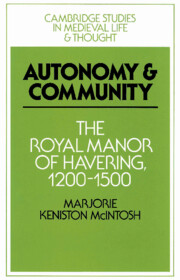Book contents
- Frontmatter
- Contents
- List of figures and tables
- Acknowledgements
- List of abbreviations
- INTRODUCTION
- PART I HAVERING, THE CROWN AND EXTERNAL CONTROL, 1200–1500
- PART II ECONOMIC INDEPENDENCE AND ITS CONSEQUENCES, 1251–1460
- PART III COMMUNITY, CONFLICT AND CHANGE, 1352–1500
- 5 THE MANOR COURT AND THE RESOLUTION OF LOCAL PROBLEMS, 1352–1460
- 6 NEW PROBLEMS, NEW SOLUTIONS: THE LIBERTY OF HAVERING-ATTE-BOWER, 1460–1500
- Appendix I Officials of the manor, palace, park and Liberty of Havering, 1200–1500
- Appendix II Havering cases heard in the central courts, 1199–1499
- Appendix III Surviving rolls of the Havering manor court to 1500
- Appendix IV Priests and clerks in the parish of Hornchurch, 1200–1500
- Appendix V Minimum numbers of Havering crafts- and trades-people, 1200–1499
- Bibliography
- Index
5 - THE MANOR COURT AND THE RESOLUTION OF LOCAL PROBLEMS, 1352–1460
Published online by Cambridge University Press: 02 December 2009
- Frontmatter
- Contents
- List of figures and tables
- Acknowledgements
- List of abbreviations
- INTRODUCTION
- PART I HAVERING, THE CROWN AND EXTERNAL CONTROL, 1200–1500
- PART II ECONOMIC INDEPENDENCE AND ITS CONSEQUENCES, 1251–1460
- PART III COMMUNITY, CONFLICT AND CHANGE, 1352–1500
- 5 THE MANOR COURT AND THE RESOLUTION OF LOCAL PROBLEMS, 1352–1460
- 6 NEW PROBLEMS, NEW SOLUTIONS: THE LIBERTY OF HAVERING-ATTE-BOWER, 1460–1500
- Appendix I Officials of the manor, palace, park and Liberty of Havering, 1200–1500
- Appendix II Havering cases heard in the central courts, 1199–1499
- Appendix III Surviving rolls of the Havering manor court to 1500
- Appendix IV Priests and clerks in the parish of Hornchurch, 1200–1500
- Appendix V Minimum numbers of Havering crafts- and trades-people, 1200–1499
- Bibliography
- Index
Summary
Havering's autonomy and its unusual economic patterns together had a pronounced impact upon the community's internal political life. Because there was so little seigneurial, legal or administrative regulation, the tenants were not only free to deal with nearly all local problems themselves, they were indeed forced to do so. Havering's commercial structure generated a complex society, involving a considerable amount of friction, but also produced a body of men who were particularly concerned with local control. These leaders were established residents who profited from Havering's economic system: substantial farmers and the more prosperous tradesmen and craftsmen. It was to their own personal benefit as well as good for the community as a whole to see that a reasonably harmonious and orderly atmosphere was preserved, one in which business might flourish. The institution through which the dominant men wielded power was the manor court. Havering's privileged status and slack supervision by the crown broadened the court's jurisdiction to an exceptional range. The willingness of the tenants to employ this authority was striking. The operation of the court forms a counterpart to those features of the manor's history which we have already explored, providing an example of local cooperation at its zenith.
In the years between 1460 and 1500 Havering changed rapidly in many ways. The patterns which emerged were not entirely novel; they merely intensified tendencies already visible in the previous century. The land market pulled out of the doldrums and the number of newcomers shot upward. The economy became more heavily capitalised and specialised, causing a separation between rich and poor. Local families assumed an important role in Havering's religious life and experimented with forms of charity.
- Type
- Chapter
- Information
- Autonomy and CommunityThe Royal Manor of Havering, 1200–1500, pp. 181 - 220Publisher: Cambridge University PressPrint publication year: 1986



